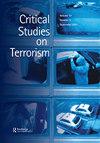Mindsets and narratives: A commentary on Quassim Cassam's Extremism.
IF 2.5
Q2 POLITICAL SCIENCE
Critical Studies on Terrorism
Pub Date : 2022-07-15
eCollection Date: 2022-01-01
DOI:10.1080/17539153.2022.2082095
引用次数: 1
Abstract
In his newest book, Extremism (Cassam 2022), philosopher Quassim Cassam brings together and analyses many different concepts in extremism studies, such as ideology, violence, radicalisation, grievances, counternarratives, fanaticism, radicalism, and fundamentalism. Central to the book is the distinction between three different types of extremism: ideological, methods, and psychological extremism. This distinction illuminates the different ways in which the term is used and can be used to identify an extremist. In this commentary, I question what I consider to be Cassam’s predominantly individualistic approach to becoming and being an extremist. I will first focus on one of the types – psychological or mindset extremism – and question its relation to (counter-) extremist narratives. Next, I draw attention to Cassam’s emphasis on the role of epistemic agency instead of the role of social or structural factors in radicalisation processes, and argue that conceptualising agency as situated diminishes the dichotomy between these different explanations.心态与叙事:评卡萨姆的《极端主义》。
本文章由计算机程序翻译,如有差异,请以英文原文为准。
求助全文
约1分钟内获得全文
求助全文

 求助内容:
求助内容: 应助结果提醒方式:
应助结果提醒方式:


